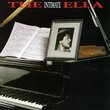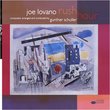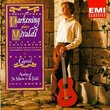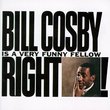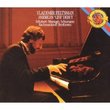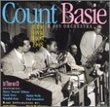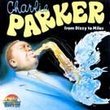| All Artists: Bela Bartok, Pierre Boulez, Chicago Symphony Orchestra, Jessye Norman, Laszlo Polgar Title: Béla Bartók: Bluebeard's Castle - Jessye Norman / László Polgár / Chicago Symphony Orchestra / Pierre Boulez Members Wishing: 0 Total Copies: 0 Label: Deutsche Grammophon Release Date: 7/14/1998 Genre: Classical Style: Opera & Classical Vocal Number of Discs: 1 SwapaCD Credits: 1 UPC: 028944704020 |
Search - Bela Bartok, Pierre Boulez, Chicago Symphony Orchestra :: Béla Bartók: Bluebeard's Castle - Jessye Norman / László Polgár / Chicago Symphony Orchestra / Pierre Boulez
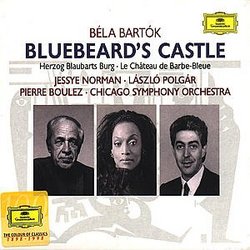 | Bela Bartok, Pierre Boulez, Chicago Symphony Orchestra Béla Bartók: Bluebeard's Castle - Jessye Norman / László Polgár / Chicago Symphony Orchestra / Pierre Boulez Genre: Classical
But for one thing, this has the makings of a classic. Pierre Boulez's recent Bartok recordings with the Chicago orchestra have been standard-setting. And Jessye Norman couldn't be better equipped, vocally and dramatically,... more » |
Larger Image |
CD DetailsSynopsis
Amazon.com essential recording But for one thing, this has the makings of a classic. Pierre Boulez's recent Bartok recordings with the Chicago orchestra have been standard-setting. And Jessye Norman couldn't be better equipped, vocally and dramatically, to sing Judith. She doesn't disappoint: Her grand temperament suits her character's aggressively curious nature while her increasingly dark lower range is put to good use in conveying the awe and horror of what she finds while probing her husband's past. Polgar is also alert to the dramatic turns of Bluebeard. However, Boulez seems a bit less involved--less coloristically attuned to the score than in past Bartok recordings. But this CD is still of great interest. --David Patrick Stearns Similarly Requested CDs
|
CD ReviewsLISTEN WITHOUT PREJUDICE J. C. Bailey | East Sussex United Kingdom | 06/29/2001 (5 out of 5 stars) "The thought of this work is intimidating to many prospective listeners. Bartok's achievement as a composer of soaring late romantic melodies and exotic harmony is sometimes eclipsed by his more angular and abrasive modernist works. Devotees of conventional opera may be perturbed by the prospect of a through-composed 60 minute duet without a single recognizable aria. Lovers of wobbly tenor and soprano crescendos may balk at a work written entirely in a dark and low register (indeed it is sometimes performed by a bass and a contralto, memorably so by the warm-hearted husband-and-wife operatic team of Walter Berry and Christa Ludwig).The answer to those interested but nervous prospective purchasers is, listen without prejudice. The subject matter is at least superficially dark and stark. There are no comforting romantic arias to listen to as you cuddle down in your gondola, but this single CD is crammed with more truth and beauty (not to mention honest romanticism) than a shelf-full of Puccini-esque warbling. From the opening (rarely performed) spoken verse prelude through to the last resigned chord, this work is never anything but rivetting.Part of the secret is the libretto (which is worth following in translation for the first few spins of the CD). As arguably the greatest composer of the 20th century, Bartok only found one libretto in his entire career that was strong and original enough to get his creative juices flowing. It tells the story, shoe-horned into a single hour-long conversation replayed in real time, of how a curious and provocative young bride discovers the obsessions and emotional baggage of the older man she has just married. In doing so, she navigates Everywoman's journey into married life, pre-figuring the familiarisation, the taking-for-granted, and finally the peaceful acceptance that mark successful co-habitation. Thus far from being depressing, the fundamental message is uplifting. The drama and tragedy of this awesome composition are woven around the loss of freedom and romantic idealism that is the acceptable price to pay for a long-term committed relationship - a worthy message in an era where prospective couples are often doomed by a reluctance to make mutual concessions.The voices, the orchestral textures, and the snippets of half-formed melody that morph smoothly from one to the next, are simply devastating. La Norman shows the tonal beauty, dramatic creativity and the discipline of a born liedersinger throughout. Polgar is if possible even more awesome, perhaps through being more comfortable singing in Hungarian rather than from any greater affinity with the music itself. But the real architect of this performance is naturally Boulez, and his real achievement seems to be in his architectural grasp, more even than his astonishing sonic and textural mastery.Architecture is the crux of this composition. The entire narrative thread is provided by the exploration of locked rooms in a gothic castle. In an opera usually performed in a stylised set with little in the way of physical props, the music has to represent everything: the rooms, the walls, the doors, the windows, the view out of the windows, the objects in the rooms . . . all of which carry a symbolic meaning. The spaces, the silences, the loud/soft dynamics, are essential.Boulez, the two singers and the Chicagoans are more than up to all this. The digital production sparkles. The packaging is excellent. Unreservedly recommended." A Revelation Gapare Pacchierrotti | Canada | 12/28/1999 (5 out of 5 stars) "From my experience, this is the first recording of worth in the opera's original language. I have recordings of it in English and German. I have seen a performance from the Met with Norman in it, which was wonderful. However, this was quite a different experience. As is often the case when music is sung in its original language the subtles are very different. I was at once amazed and thrilled with the result. Norman was exceptional, as seems to be her regular way of doing things, and Polgar a very mysterious Bluebeard. It was the orchestra that disappointed ( now mind you, it was still extremely good! ) because it seemed too studied and less emotional than it should have been.I must admit I came to this opera only recently, with the Metropolitan Production, and even then had to be brought there by force. I am not a lover of strange sounds and bad harmonies. So much of what was written during this same time period is, for me, a trial to the ear and the endurance. However, I was stunned by the performance ( played with another modern opera, which I was stunned by and actually enjoyed! ), and was really impressed with the work. I can only recommend that if this type of music is new to you, buy it with great singers with truly great voices of wondrous quality. This recording will not disappoint, and in fact may actually do for you what Norman did for me -- open your ears, eyes, and mind to new and wonderful works." "Stones of Sorrow" John D. Pilkey | Santa Clarita, CA USA | 09/30/2006 (5 out of 5 stars) "The best way to explain this great work is to listen to it as Bartok's orchestral music interprets the theme behind each door. Judith asks, "Why no windows? No sweet daylight?" None of these questions needs to be answered because the music answers everything. Bluebeard's reference to Judith's father and warnings about proceeding further are close parallels to Jean Cocteau's Beast in his poetic film La Belle et la Bete. There must be a relationship between the two magical works. Appropriately Philip Glass converted Cocteau's film into an opera in the 1990s. As for the doors, Bluebeard warns, "None must see what is behind them"; but we will hear what is behind them in the most remarkable orchestral music imaginable. This opera is one of those uncanny works that seems never to have been performed or heard before the next time you listen to it. Like Poe's House of Usher, the castle seems sentient. Judith says, "I heard your castle sighing" and "Look, the walls are bleeding." Bluebeard agrees: "Stones of sorrow thrill with rapture." Much of the ambience of Bartok's opera depends on the Hungarian language as rendered by Jessye Norman and Laszlo Polgar."
|

 Track Listings (12) - Disc #1
Track Listings (12) - Disc #1